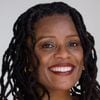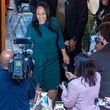Soumaya Khalifa was 12 years old when she came to the U.S. decades ago from Egypt with her parents and two siblings.
The Cobb County resident and her husband have raised their own children in Georgia and have grandchildren here and in Texas. Family members are Muslim and are Southerners through and through, Khalifa said. Which might explain her uniquely Southern response to to GOP presidential front-runner Donald Trump after his call to bar all Muslims from entering the U.S.
“Bless his heart,” Khalifa said.
It’s not that the gravity of Trump’s proposal was lost on Khalifa, she said, but that it was so outrageous, so insidious, and potentially threatening that it was hard to take seriously.
“Someone who is a presidential front runner saying these things puts that group of people at risk,” Khalifa said. “It makes it OK to hate Muslims and to hurt Muslims and it creates a climate of hatred that says to people it’s OK to act that way and to feel that way.”
On the heels of the San Bernardino massacre of 14 people at an office party by a Muslim couple who authorities say had been “radicalized,” Trump’s comments have shocked Muslims across the country. There should be a “total and complete shutdown of Muslims entering the United States,” Trump said in a statement issued Monday. That evening, in front of a cheering crowd at a South Carolina campaign rally, Trump reiterated his position saying the ban should last “until our country’s representatives can figure out what the hell is going on.”
While the Republican Party establishment - from former Vice President Dick Cheney to U.S. House Speaker Paul Ryan - slammed Trump’s remarks, the stance did win some support in the GOP grass roots.
“I think it’s a good idea to stop and reassess rather than open Pandora’s Box,” said Kevin Stinson, a 33-year-old from Royston who was at Cobb County rally Tuesday for Trump rival Ben Carson. “I’m concerned the wrong people could be allowed in, and I want to be sure we know what’s going on before we open the borders.”
Still, in Georgia, Muslim Americans expressed outrage, fear and disappointment, in the candidate and his proposal which some said echoed rhetoric that spawned Nazi Germany.
“Some one like him should should not be this bigoted, this divisive,” said Umarah Ali, a 24-year-old law student at Georgia State University. “To me he was calling for a second Holocaust. It’s unreal.”
On Tuesday Trump tried to refine his statement in interviews with national media. He said members of the U.S. armed forces who are Muslims or Muslim Americans traveling on business would be allowed back into the country because they are citizens. In an interview with CNN Tuesday Trump also reiterated his call to bar Syrian refugees who are Muslims from entering the country, but said Christian Syrian refugees could be allowed.
For Saif A. Sarfani a 19-year-old sophomore at Berry College, there is no daylight between any of Trump’s prescriptions. To him they all add up to the same thing: anti-Muslim.
“First off, it’s a ridiculous idea to bar anyone based off their religious beliefs,” said Sarfani, who came to the U.S. when he was four years old. “I don’t think Donald Trump understands that ISIS is not coequal to all Muslims.”
The FBI is trying to determine how and who radicalized the husband and wife who committed the San Bernadino massacre. Initial reports said the wife, Tashfeen Malik, had pledged allegiance to ISIS in a Facebook post just before the murders.
Muslims make up less than 1 percent of the U.S. adult population. Pew Research Center’s 2014 Religious Landscape Study found that 0.9 percent of U.S. adults identify as Muslims. A 2011 survey of Muslim Americans, which was conducted in English as well as Arabic, Farsi and Urdu, estimated that there were 1.8 million Muslim adults and 2.75 million Muslims of all ages in the country. That survey also found that a majority of U.S. Muslims, 63 percent, are immigrants. By 2050, Muslims are expected to be the second largest religious group in the country at 2.1 percent of the population, surpassing Jewish Americans, according to the Pew Center.
Ihsan Bagby, an associate professor of Islamic studies at the University of Kentucky, has researched the number of mosques in the United States. In 2011, the most recent year available, there were 2,100, up from 1,200 in 2000.
The number of people attending each mosque could range from a few dozen to several thousand. Bagby attributed to increase in the Muslim population to immigration, conversion and a high birth rate. Atlanta has two large mosques, Al-Farooq Masjid in Midtown and the Atlanta Masjid of Al-Islam.
Among several Muslims interviewed Tuesday, two sentiments kept recurring. On the one hand several said they felt a need to defend their faith, but on the other, they felt should not have to apologize for the actions of people who are using Islam as a cover to commit terrorist acts.
“The Muslim community is having this narrative of, ‘What can we do to prove we are not violent people,’” said Ali.
At the same time, “there are Muslims out there who say, ‘Why should I apologize? I didn’t do that. I had nothing to do with that,’” said Amjad Taufique, a partner in a remodeling firm and a board member of the West Cobb Islamic Center. “Violence is not an acceptable solution to any problem and there are hundreds of thousands of Muslims who would agree with me.”
But many such as Taufique and Ali are concerned that the charged language about Muslims may lead to violence against them and their mosques. Taufique’s wife and daughters wear hijab, the traditional headscarf worn by many Muslim women. He worries covering may make them targets. Ali also wears hijab and has been doing it half her life. She does not intend to stop and sees the instantly recognizable scarf as an expression of her faith, one she’s willing to discuss with others.
“My whole life has been lived in the shadow of what happened in 9/11,” Ali said. “You can’t teach people what you are if you hide. I can be a Muslim and I can be an American. They are not exclusive. I can love my faith as much as I love my country.”
In the midst of the furor over Trump’s comments, there have been moments of grace, Khalifa said, with non-Muslim friends and associates, contacting her to say they found the whole episode appalling.
“Yes, this is bring out the worst in some people, but it also brings out the best,” said Khalifa, founder of the Islamic Speakers’ Bureau.
Amin Tomeh, 44, a professional civil engineer, said he was “disappointed and deeply concerned” about Trump’s comments.
“This country is different,” said Tomeh, who was born in Syria and moved to the United States in 1986 to study at the University of Pittsburgh and , later, Georgia Tech. “Such primal fears are usually peddled politically in other places, not this country. We are a nation with specific laws and a constitution which does not require people to meet a religious litmus test.”
Greg Bluestein contributed to this report
About the Author







